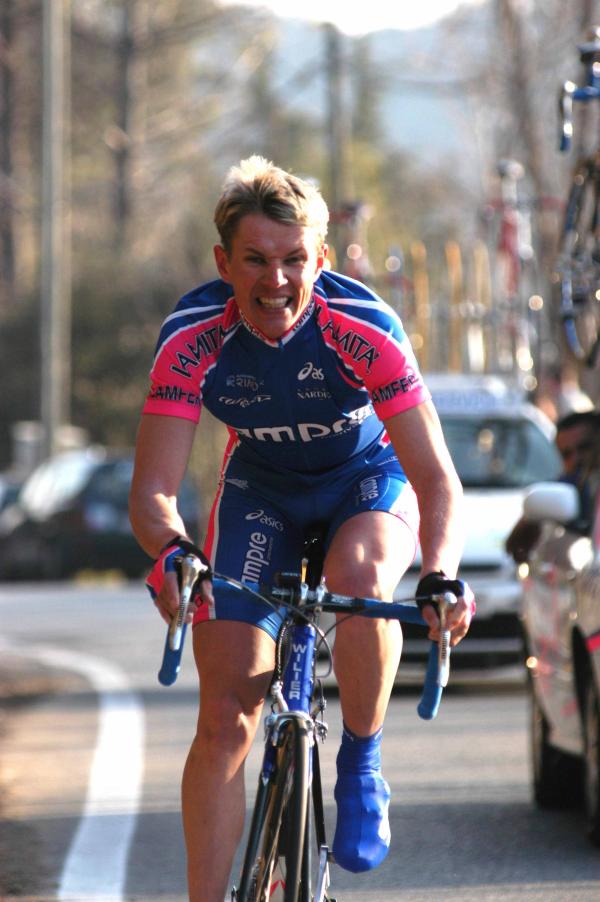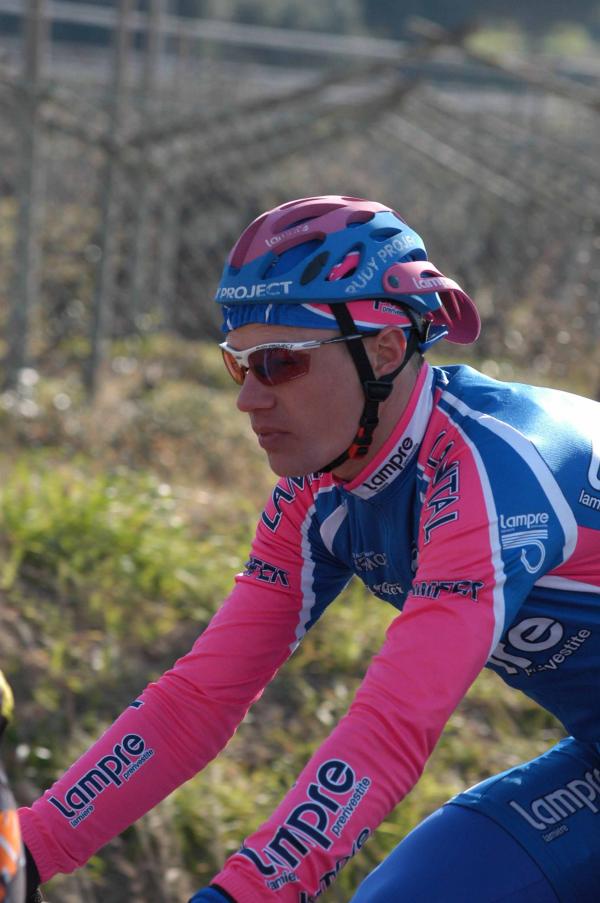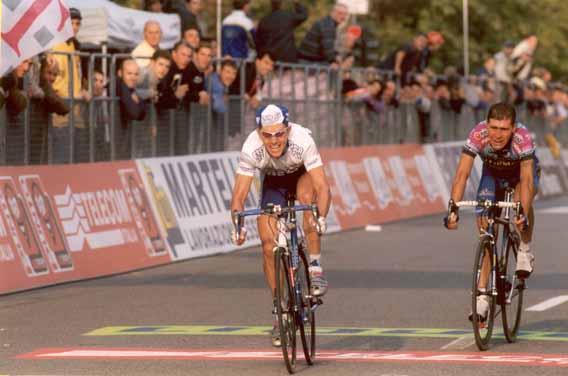Raimondas Rumsas carries on family name at junior world championships
Rumsas Senior comments on Armstrong



The son who follows in his father’s sporting footsteps takes on an unspoken risk – he must spend at least some time burdened by the weight of his name, knowing that only the happy few ever fully escape the shadows cast by the father’s legacy.
18-year-old Raimondas Rumsas has quietly accepted that challenge, and the Lithuanian lined up at the junior men’s time trial at the world championships in Valkenburg on Monday, grinding his way to 47th place, 2:29 down on winner Oskar Svendsen (Norway).
The teenager is the son of the man who finished third in the 2002 Tour de France and of the woman – Edita Rumsas – who was stopped at the Franco-Italian border that July with a car boot filled with 37 different medicines and empty syringes with traces of EPO.
On Monday, Raimondas Rumsas Senior was himself behind the wheel, driving the Lithuanian team car behind his son, but afterwards, he preferred to concentrate on his namesake’s performance rather than contemplate the feelings the occasion had provoked.
“My emotions are good,” Rumsas told Cyclingnews. “But my son wasn’t on a good day today and it went as it went. He’s lost over two minutes in the time trial, which would mean that there’s room for improvement.”
Rumsas is hopeful that a strong showing in Limburg this week can land his son a place at one of the top Italian amateur squads in 2012, and he said that they had deliberately held off signing any agreements until after Friday’s road race.
“We haven’t signed with anybody just yet, we’re waiting for the road race. We’re hoping to get a good result, so we’ll have to wait for the weekend and hope that it comes,” Rumsas said. “Raimondas is still only 18, and he can still improve. He’s an all-rounder – he defends himself on the climbs and he’s good in the time trial.”
Get The Leadout Newsletter
The latest race content, interviews, features, reviews and expert buying guides, direct to your inbox!
Rumsas and his family still resides near Lucca, Italy, where he based himself in his racing days. “My children go to school there, so we’re almost Italian,” Rumsas joked. His quiet Tuscan life is a far cry from that murky summer of 10 years ago, when images of French police handcuffing Edita, her glum expression almost comically at odds with her multi-coloured jumper, delighted picture editors at newspapers across Europe.
Edita told French police that the medicines were destined for her mother Yakstenia and was detained for 75 days for her troubles, while her husband refused to return to France for questioning. Over three years later, Raimondas Rumsas was himself eventually handed a four-month suspended sentence. By that time, Rumsas had tested positive for EPO at the 2003 Giro d’Italia and served a year’s suspension, before returning to win two more national time trial titles.
Now aged 44, Rumsas continues to compete and win on Italy’s startlingly competitive Gran Fondo circuit. On any given Sunday on the peninsula, he does battle with the likes of Massimiliano Lelli, Mario Cipollini and Jamie Burrow, not to mention a cast of thousands of weekend warriors.
“I like the bike. I appreciate the riders who do this work. I’m happy because I’ve met a lot of people through riding my bike,” Rumsas said of his current relationship with the sport.
But in cycling, as in life, the past is never dead; it’s not even past. The history books are in a state of constant revision and the man who stood on top of the podium in Paris in July 2002, Lance Armstrong, is set to lose all of his Tour de France titles. Rumsas laughed grimly when asked for his opinion on Armstrong’s decision not to contest USADA’s charges of doping and conspiracy.
“I think that cycling has to change. If it continues like this, it won’t lead to anything good for our sport,” Rumsas said. “I think the politics have to change. Politics is coming into things, it has nothing to do with cycling and I think that’s wrong.”
Rumsas was vague when pressed on what precisely he meant by ‘politics.’ “I’m talking about the people who manage cycling. Armstrong is a person and a rider like any of us. There are people in charge in cycling who need to reflect for a bit,” he said.
“I’m not talking specifically about USADA or anyone else. I’m just saying that the politics are wrong and it’s still going on, in the whole sport. It’s a general thing. It’s not anybody’s fault specifically. Either everyone is guilty or nobody is.”
But what of Raimondas Junior as he makes his fledgling steps on the international stage? Is he entering a healthier and cleaner environment than the one Rumsas himself did some twenty years ago?
“Let’s say that everybody is different,” Rumsas said. “It depends on the person and it all depends on the individual’s education and upbringing. It starts as children with the parents and then with coaches and so on. Before anything else, you need to look at the education, and then when they’re older, 18 or 21 years, it’s up to the individual to think and choose his own path.”
By then, the final riders had finished, and with Raimondas Junior’s time trial bike safely tethered to the roof of the car, Rumsas sat back into the driver’s seat and pulled away, headed towards the Lithuanian base in Simpelveld.

Barry Ryan was Head of Features at Cyclingnews. He has covered professional cycling since 2010, reporting from the Tour de France, Giro d’Italia and events from Argentina to Japan. His writing has appeared in The Independent, Procycling and Cycling Plus. He is the author of The Ascent: Sean Kelly, Stephen Roche and the Rise of Irish Cycling’s Golden Generation, published by Gill Books.